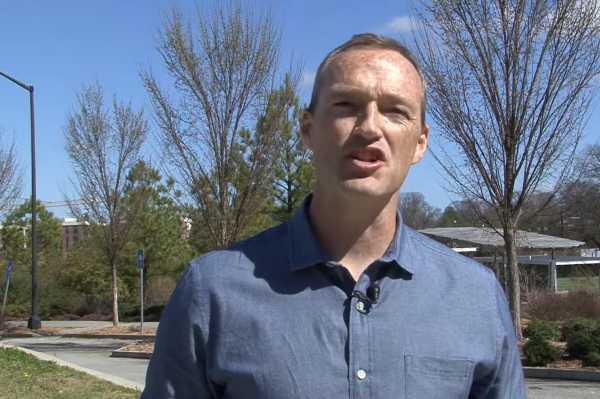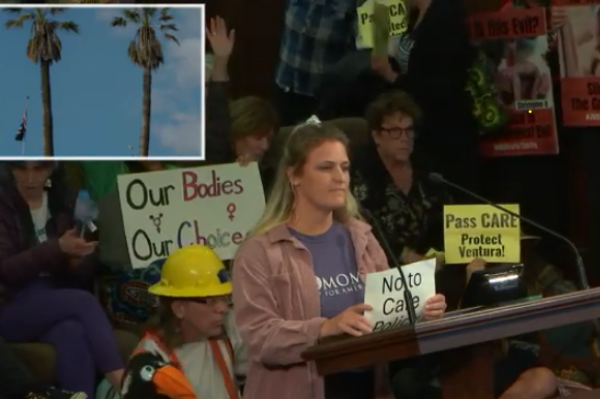Did Jesus Die for All or for Only the Elect? Two Theologians Debate
For whom did Jesus die? For the sins of the entire humanity or only for the elect? This was the topic of a live debate between Messianic Jewish apologist Dr. Michael L. Brown and Alpha and Omega Ministries Director Dr. James White on RevelationTV.com Friday evening.
The issue boils down to what the intention of the Father, the Son and the Holy Spirit was in Christ going to the cross, said White, who heads the Phoenix, Ariz.-based evangelical Reformed Christian apologetics organization, as the debate began Friday at 9 p.m. EST.
"Jesus' death on the cross was a covenantal death," White said. "God deals with His people in the form of a covenant, and the new covenant was established in the blood of Jesus Christ. ... That has a specific audience, and a specific perfecting effect for those for whom it is made. Specifically, Jesus Christ died in behalf of His elect people and that in so doing He procured eternal redemption in their place."
White, who has taught Greek, systematic theology and various topics in the field of apologetics, quoted Hebrews 9:15 as a basis for his argument. "For this reason Christ is the mediator of a new covenant, that those who are called may receive the promised eternal inheritance – now that he has died as a ransom to set them free from the sins committed under the first covenant," reads the verse.
The stated intention for Jesus' death on the cross is revealed to us in this passage, he said.
Brown, whose nationally-syndicated radio show, "The Line of Fire," airs throughout the United States, disagreed.
"The testimony of the Scripture is overwhelmingly clear that Jesus died for the sins of the entire world, so as to pay for the sins of every human being who's ever lived, demonstrating the grace and love of God to the entire human race and securing the salvation of everyone who believes," stated Brown, president and professor of practical theology at Fellowship for International Revival and Evangelism School of Ministry in Concord, N.C.
Brown quoted John 3:16, "For God so loved the world that he gave his one and only Son, that whoever believes in him shall not perish but have eternal life."
The term, "the world," is clearly defined in John's Gospel, and it cannot mean the elect, argued Brown, director of the Coalition of Conscience.
He also quoted 1 John 2:2 ("He is the atoning sacrifice for our sins, and not only for ours but also for the sins of the whole world.") and 1 Timothy 2:3-6 ("...God our Savior, who wants all people to be saved and to come to a knowledge of the truth. For there is one God and one mediator between God and mankind, the man Christ Jesus, who gave himself as a ransom for all people...").
White responded by asking if the word "all" is used without distinction in the Bible. God demonstrates His love toward the entire created order in His Son Jesus Christ, but even John 3:16 limits who benefits from Christ's death, for those who believe, he said. He added that faith is described as a gift of God.
However, Jesus' death was not just the demonstration of God's love; He also took away the sins of the world, Brown contended.
Brown said he does not believe God can predestine anyone to hell. In fact, culpability comes only when some choose not to believe in Jesus' death which was also for them, he argued. If they were not elected in the first place, then why should they be held responsible for their response in the negative?
White said his concern is, what the result of the death of Jesus Christ is, and the extent and the impact of atonement. He asked if Jesus intercedes for everyone, then why His intercession is failing for some.
Faith and repentance are a gift of God, he repeated.
Brown argued that the New Testament repeatedly says we are justified by faith, and not by Christ's death only. "So there is human participation."
The sovereign God, he added, decided to create the world while foreseeing the results. "I have no problem with foreknowledge and free will ... But God set things up so that there would be a people who responded to His call to be His, and many who would not."
After the debate, a viewer asked White if he ever extended the Gospel invitation to a group of people comprising of both Christians and non-Christians, and if so how could he be honest by offering salvation to everyone because Jesus did not die for everyone?
White responded by saying we are called to make a clear Gospel presentation, and it is not for us to know the identity of the elect.
About how one's belief in predestination can affect his or her evangelism ministry, Brown said if he went to a village for preaching, he'd have hope that at least some of the people there would respond to the Gospel. On the other hand, those who believe in election may not know if there's anyone from the elect in that group, he added.
While they had disagreements, Brown and White appreciated each other's ministries and walk with the Lord.
On Saturday evening, the two theologians will debate on whether the gift of healing has ceased for the present age.






















